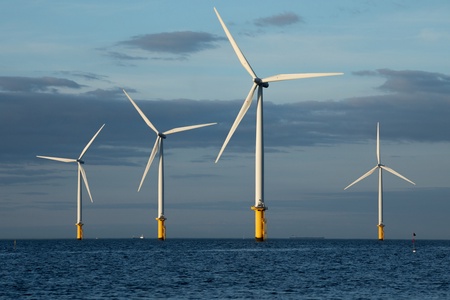An Aberdeen-led project to explore more efficient ways of installing offshore windfarms will share in £800,000 of new funding to support the renewable energy sector.
The collaborative research proposal between the National Decommissioning Centre (NDC) – a partnership between the University of Aberdeen and Net Zero Technology Centre – and Ellon-based Aubin Group, will examine novel and more cost-effective methods of development, within the context of the quest to obtain Net Zero goals in the industry.
The project builds on Aubin’s patented pumpable variable buoyancy technology (Deepbuoy), which offers a more precise and controlled lifting solution to commonly used air bags, making lifting operations easier and safer for cranes, divers and ROVs.
Detailed modelling simulations will be performed by the NDC, utilising its state-of-the-art, real-time, real-physics Marine Simulator, to build models of Aubin's Deepbuoy technology to assess its applicability, benefits in terms of costs and reduced carbon footprint for installation of wind farms infrastructure.
The Aberdeen project is one of eight across the UK to receive support from the Supergen Offshore Renewable Energy (ORE) Hub through its Flexible Funding Scheme, designed to support ambitious research in offshore renewable energy.
The Hub’s Flexible Funding was established to enable UK researchers to respond to a number of key research challenges in ORE. It also aims to support project areas that complement existing research, fill gaps or add cross-cutting activities to explore the transfer of research findings between sectors within ORE.
The Aberdeen project will also benefit from additional funding from the Offshore Renewable Energy Catapult’s Floating Offshore Wind Centre of Excellence (FoW CoE).
Dr Marcin Kapitaniak is an Independent Research Fellow at the NDC. As principal investigator he says the project will allow the technology to progress, potentially leading to the reduction in costs of installation of floating wind farms.
“The NDC’s simulator allows the research team to conduct virtual field trials, to demonstrate the capabilities of liquid buoyancy and the underwater lifting system in shallow, median and deep-water wind farm installations,” he added.
“Through real-time simulation studies we will be able to identify challenges relating to the installation of floating wind farm anchors and mooring systems.
“The findings from our studies should lead to the development of novel techniques for deployment of wind farm anchors and mooring systems.”
The research team will also compare the methods developed through the project with conventional installation methods and emerging competitive new lifting methods, with the aim of demonstrating a significant reduction in costs and reliance on heavy lift vessels for the installation of wind farms.
Dr Callum Scullion, product development manager at Aubin Group said: “It is exciting to work with the National Decommissioning Centre on a project that can enable the scaling of floating windfarm projects in an environmental and cost-effective manner.
“Utilising state-of-the art technology to run virtual trials can inform and de-risk the design and installation of future mooring and anchor systems, which enables a reduction in kWh costs of floating wind and could reduce the UK economy’s reliance on fossil fuels further.
“The information we will gather in these virtual trials can also help towards reducing the environmental impact of these enormous infrastructure projects on the marine environment, reduce carbon footprint, optimise harbour and vessel options, and help plan for full lifecycle deployment, including field maintenance and future decommissioning.”
Roger Esson, the Net Zero Technology Centre’s Head of Industry & Partner Network, commented: “The funding received is a huge boost to the important research required to find more efficient methods of installing offshore windfarms. As we look to technology to unlock the potential of offshore wind, this type of project is pivotal in our progress of achieving net zero.
“The NDC’s state of the art simulator technology will play a key role in this project and its outcomes could be game-changing for the sector. At the Net Zero Technology Centre our aim is to support industry through our collaborations and this is a great example of how doing that can help us drive the energy transition forward.”


